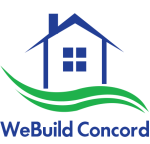Our Tools, Strategies, and Partnerships
WeBuild Tools: Community Land Trust and Equity Donations
Community Land Trust
 WeBuild acts as a community land trust, ensuring a home or property stays perpetually affordable (ownership or rental). We are the only community land trust in Cabarrus County and some nearby jurisdictions. Community land trust models ensure permanent affordability and stability while increasing gradual wealth across more households. For owner-occupied dwellings, the land cost is removed from the equation and allows residents to own a home without the additional tax burden of the land surrounding the improvements. Thus, the owner only pays a mortgage on the actual house. A small monthly land lease ($25 – $50) is incorporated with their overall mortgage to ensure residents do not pay more than thirty percent of their income on housing. This process makes ownership affordable, gradually increases wealth, and provides an instant asset.
WeBuild acts as a community land trust, ensuring a home or property stays perpetually affordable (ownership or rental). We are the only community land trust in Cabarrus County and some nearby jurisdictions. Community land trust models ensure permanent affordability and stability while increasing gradual wealth across more households. For owner-occupied dwellings, the land cost is removed from the equation and allows residents to own a home without the additional tax burden of the land surrounding the improvements. Thus, the owner only pays a mortgage on the actual house. A small monthly land lease ($25 – $50) is incorporated with their overall mortgage to ensure residents do not pay more than thirty percent of their income on housing. This process makes ownership affordable, gradually increases wealth, and provides an instant asset.
Homeowners in a community land trust property have most of the rights other homeowners have. They can sell their home or pass it on to family members. Under our current community land trust policy, new homeowners are guaranteed equity of 2.5% each year in a shared equity model, regardless of market trends. Because of the shared equity model, owners must get prior approval to make any changes to the surrounding land and agree to sell to individuals within the same income range when disposing of the home. WeBuild can use a single subsidy and shared equity model across several owners. Overall, we create wealth in a way that supports affordability and stability.
For example, according to the Lincoln Institute of Land Policy, six out of ten households that purchase a community land trust home save enough money to sell and buy their second home in the open market due to wealth generation. Most of the households were only able to buy their first home because of the land trust model. The community land trust properties create stability as well.
At the peak of the foreclosure crisis in 2010, 8.57 percent of mortgages were in serious delinquency across all incomes compared to only 1.3 percent in community land trust homes. Foreclosure proceedings were similar, with 4.63 percent across all incomes and only .46 percent in land trusts. Thus, if a neighborhood or community needs a balance of permanent affordability, stability, and gradual wealth creation across multiple families with one subsidy, the community land trust model is a viable option.
Equity Grants
Equity grants ensure access to homes and protect the comparative values of neighborhoods. When a home appraises higher than affordable or workforce income standards, we provide a noncash equity grant for the buyer. For example, if a home appraises for $250,000 and the qualified buyer can only afford a mortgage of $225,000, WeBuild will provide an equity grant of $25,000 to close the gap. Thus, the sales price will be recorded at the appraised value and will not impact home values in the area. At the same time, the buyer will obtain a home at an affordable price. Equity grants provide a win for community property values and new homeowners. Combined with downpayment assistance and the deed restriction or community land trust models, it makes affordable and workforce housing advantageous for all neighborhoods.
Strategies: Single-Family, Multi-Family, Mixed-Income, Mixed-Use and NOAH
Single, Multi-Family, and Mixed-Income
 WeBuild uses a variety of housing strategies that meet the demands of a growing city and county and provides dignity for residents. Many nonprofits focus on single-family developments. We build single-family homes with unique elevations in traditional neighborhoods. These homes offer a homeowner experience with an upgraded look and feel for low to moderate-income residents.
WeBuild uses a variety of housing strategies that meet the demands of a growing city and county and provides dignity for residents. Many nonprofits focus on single-family developments. We build single-family homes with unique elevations in traditional neighborhoods. These homes offer a homeowner experience with an upgraded look and feel for low to moderate-income residents.
Some settings and neighborhoods are closer to urban centers or need greater density. WeBuild focuses on multi-family developments to create more significant opportunities for ownership and rental. On some traditional single-family lots, we subdivide the property to develop two to three homes that accomplish a similar function. To increase housing opportunities, we must use strategies that provide some density without clustering all our affordable units in one area.
Mixed-Use and NOAH
Mixed-use and NOAH (naturally occurring affordable housing) are essential strategies for WeBuild and our residents. Mix-use projects create opportunities to align housing with economic development, jobs, and entrepreneurship and use spaces efficiently. On a related note, NOAH projects repurpose existing homes or buildings for affordable, workforce, and mixed-income housing. Instead of selling older affordable dwellings or destroying properties with historical significance, you convert them into bridges between the old and the new.
These developments combine the need for housing and neighborhood rejuvenation and connect it to the neighborhood’s economic aspirations. Mixed-income and NOAH projects provide unique ways to reshape our community.
Partnerships and Systems Change
Community Input and Co-investment
 WeBuild believes partnerships are a way to reshape communities through input and co-investment. We have an Advisory Council of several partners, agencies, and residents outside our Board. These community members provide feedback for our construction projects, locations, marketing, partnerships, and other operations. In addition to the advisory council, we connect with neighborhood associations and businesses when proposing housing development in specific areas. This allows us to build considering neighborhood aspirations and connect with the right partners. We base most of our partnerships on referrals, input, co-investment, and construction.
WeBuild believes partnerships are a way to reshape communities through input and co-investment. We have an Advisory Council of several partners, agencies, and residents outside our Board. These community members provide feedback for our construction projects, locations, marketing, partnerships, and other operations. In addition to the advisory council, we connect with neighborhood associations and businesses when proposing housing development in specific areas. This allows us to build considering neighborhood aspirations and connect with the right partners. We base most of our partnerships on referrals, input, co-investment, and construction.
WeBuild works with private and public sector partners to build and buy homes. The City of Concord and Cabarrus County are examples of large partners that co-invest in constructing WeBuild homes and providing land. Private foundations offer construction and administrative support, while private companies and individuals give access to free or discounted land. These co-investment partnerships lead to greater use of resources and more housing opportunities.
In addition to these partnerships, WeBuild participates in joint grant and fund distribution activities to leverage resources and community development. For example, the City of Concord’s Housing Departments will reposition its housing authority dwellings. Because many of these dwellings are close to our Lincoln Street Townhome Project, WeBuild is co-investing with the City to help revitalize the neighborhood through a federal Community Development Grant. We are discussing the same strategy with other nonprofits for their projects. Co-investment collaborations extend private and public resources further and create more housing.
Systemic Change
As a community, we can’t wait to deal with our housing crisis only using yesterday’s thinking and methods. WeBuild’s systemic approach to housing demands a broader view of tools, techniques, and strategies for affordable and workforce goals. New tools, such as the community land trust and equity grant approach, differ from many traditional tools. Strategies that place affordable and workforce housing in nontraditional settings are new for many agencies and residents.
A 21st-century economy and the growth of our region demand multiple approaches to the issue. We can no longer ask the government or private donors to support status quo development alone. Broadening the allocation of resources to various forms of housing development, strategies, and partnerships will help us all think and act beyond our organizations and programs. WeBuild’s core values demand that we live up to these standards and share resources that develop meaningful partnerships in action and impact.

